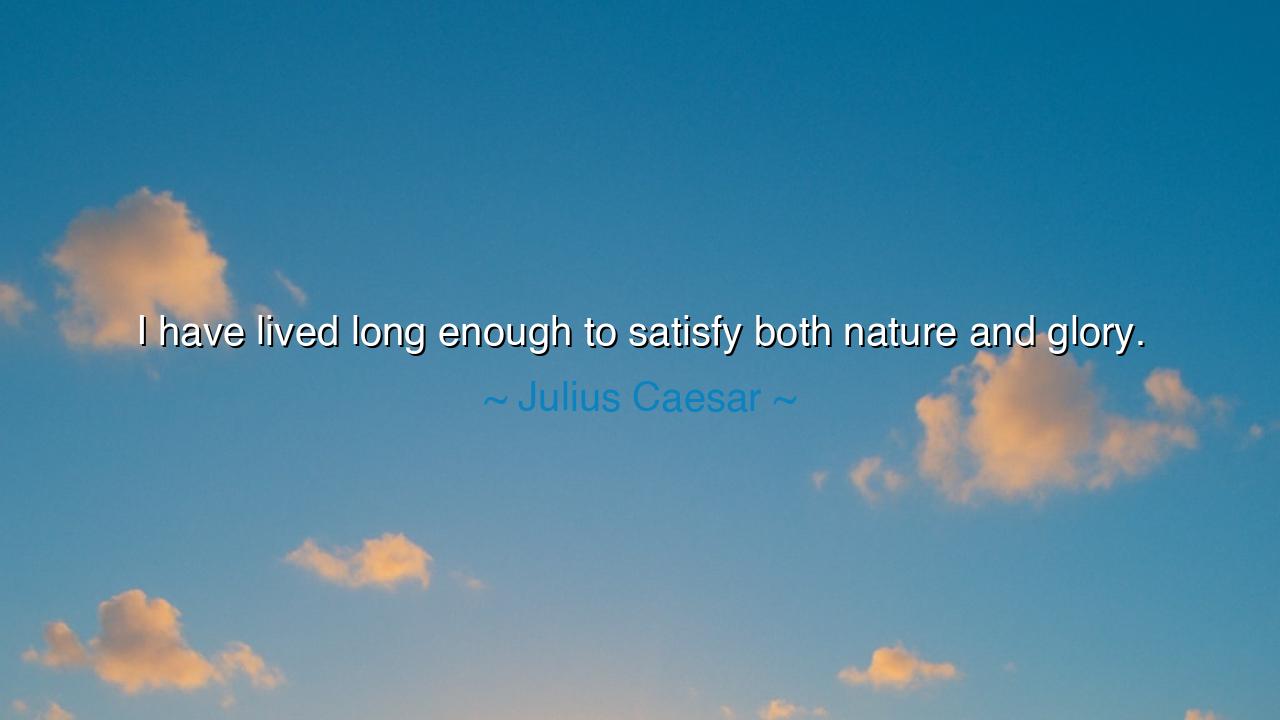
I have lived long enough to satisfy both nature and glory.






The words of Julius Caesar—“I have lived long enough to satisfy both nature and glory”—resound like the last toll of a mighty bell before silence. They capture the spirit of a man who stood at the summit of power, who had conquered nations, shaped empires, and inscribed his name upon the stones of history. In them we hear not arrogance, but resignation: the acknowledgment that life had given him what mortals seek most—nature’s years and glory’s crown—and that he was ready, if need be, to face the end.
The origin of this quote lies in the final hours of Caesar’s life, surrounded by conspirators who had once been his allies and friends. On the Ides of March, 44 BCE, as the daggers rose against him, he uttered these words not in fear, but with a strange calm. To him, the balance of existence had already been achieved: he had tasted the fullness of life, and he had carved his mark into eternity. For Caesar, nature had given him longevity, health, and vigor; glory had granted him victory, honor, and renown. What more could the Fates bestow?
Throughout history, others have echoed this sentiment in their own final hours. Alexander the Great, though dying at only thirty-two, is said to have declared that he left behind nothing but his deeds, which would speak for him forever. Though his span of years was short, his glory was immense, and in that, he too found a strange satisfaction. Likewise, Caesar’s words suggest that the true measure of a life is not in its length alone, but in the harmony between natural fulfillment and immortal renown.
Yet Caesar’s declaration is also deeply evocative, for it reminds us of the fragile balance between contentment and ambition. Many men pursue glory endlessly, never pausing to see that they already possess enough; others cling to nature’s years without ever seeking purpose or honor. Caesar, in this rare moment, stands as one who claimed both and thus felt no terror at the approach of death. He teaches us that life’s true greatness is found in living so fully that when the end arrives, it is not dreaded but embraced.
But let us not be deceived: these words also carry the sorrow of inevitability. For though Caesar believed himself complete, the truth of his murder shows that no man is ever entirely master of his fate. The envy of rivals, the tides of politics, the turning of fortune’s wheel—these are forces no human can command. Caesar’s satisfaction did not shield him from betrayal, yet it did grant him dignity in the face of it. And that dignity is perhaps the highest form of victory: to meet death not with despair, but with the strength of one who has truly lived.
From this emerges a lesson for us all. We must live in such a way that both nature and glory are satisfied—not merely seeking long years, but filling them with purpose, action, and beauty. Nature calls us to honor the body, the family, the simple joys of existence; glory calls us to strive for greatness, to contribute something lasting to the world. To neglect one for the other is to live only half a life. To embrace both is to live completely.
What, then, shall we do? Let us not delay in seeking fulfillment. Let us labor for goals that outlast us, yet also cherish the fleeting gifts of time, health, and love. Let us build not only monuments of stone, but monuments of kindness, wisdom, and courage. And when our final day arrives, may we too be able to say with calm hearts: “I have lived long enough to satisfy both nature and glory.”
Thus Caesar’s words, uttered on the brink of betrayal, pass down to us as an immortal teaching. They remind us that the measure of life is not in endless striving, nor in endless delay, but in the harmony of strength and serenity. Whoever heeds this wisdom will not fear the end, for they will know, as Caesar knew, that they have lived enough, and lived well.






AAdministratorAdministrator
Welcome, honored guests. Please leave a comment, we will respond soon